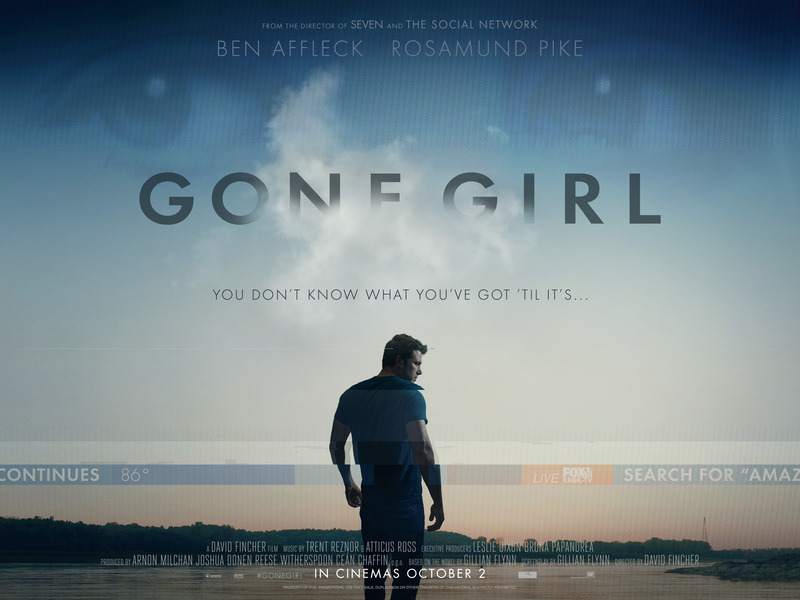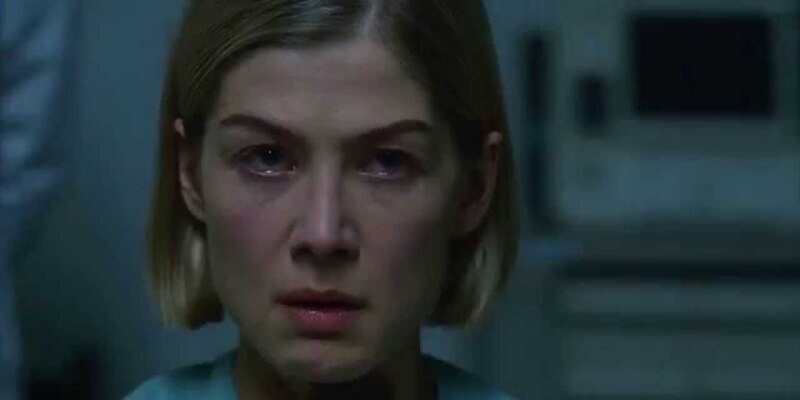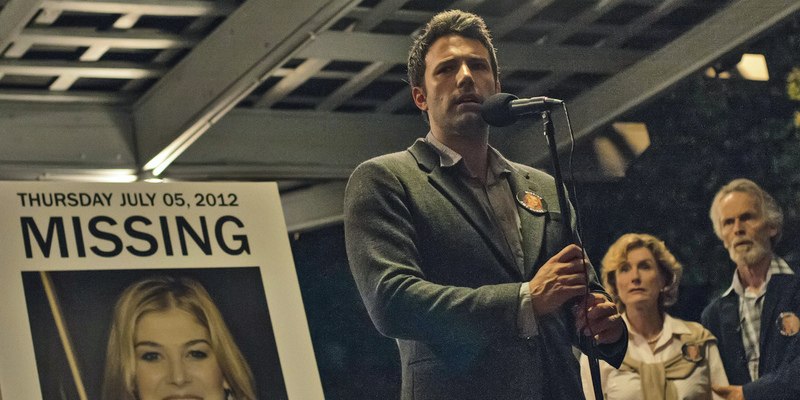
When his wife disappears, a Missouri man becomes the subject of a media
witch hunt.
Review by Eric Hillis
Directed by: David Fincher
Starring: Ben Affleck, Rosamund Pike, Neil Patrick Harris,
Tyler Perry, Carrie Coon, Kim Dickens, Patrick Fugit, David Clennon, Emily
Ratajkowski

An adaptation of the bestselling Gillian Flynn potboiler,
David Fincher's Gone Girl features a major plot twist at the conclusion of its first act.
It's not just any old twist; this one shapes both the film's narrative and
its underlying themes. This means I'm somewhat hamstrung in how far I can
explore the movie without spoiling its plot, which I won't be doing,
should you be concerned about reading any further. I surmise this is how
critics felt about reviewing
Psycho on its original release back in 1960.
Nick (Ben Affleck) returns home one afternoon to a scene of
disruption in his small town Missouri home, with his wife Amy (Rosamund Pike) nowhere to be seen. Local detective Rhonda (Kim Dickens, in the
role of her career) arrives to investigate and immediately views Nick with
suspicion. Amy is something of a local celebrity, having provided the
inspiration for her parents' series of bestselling children's books,
'Amazing Amy', and so a press conference is called. The media focusses on
Nick's apparent indifference to his wife's absence, and he becomes the
target of a national witch hunt.

A series of twists and turns follows, but thankfully Fincher never allows
the plot to overwhelm the drama. At its core, Gone Girl is a character piece, but where most such movies would be shaped by
the performances of their casts, here it's Fincher's direction and,
crucially, the masterful editing of Kirk Baxter, who oddly enough
has never edited a non-Fincher project. Due to its structure, Nick and Amy
rarely share the screen together, enjoying a distant antagonism like
Roadrunner and Wile Coyote.
You wouldn't think it from the marketing, but Gone Girl is very much a black comedy. Again,
much of the humour comes from the editing, with Fincher and Baxter subtly
manipulating comic timing. The film has many Hitchcockian elements, not
least of all this manipulation of performances through editing. Hitchcock
often cast limited actors in his films' lead roles, surrounding his stars
with more naturally gifted character actors in supporting roles, and
that's exactly what Fincher has done here. Neither Affleck nor Pike have
great range, but when a director is as confident in his images as Fincher,
that's not a problem. He's always been of the "less is more" school when
it comes to his leads, which is why a moment like Brad Pitt's cringey
"What's in the box?" schtick from Seven stands out so much. Affleck and Pike are given little in the way of
dramatic heavy lifting, and it works in their, and the film's
favour.

Like many of Hitchcock's films, it's the supporting characters that leave
the greatest mark here. As Affleck's twin sister Margo,
Carrie Coon excels in the sort of role Hitch would have cast Thelma
Ritter in. With Nick and Amy's romance on the rocks, the relationship
between Nick and Margo almost functions as the film's romantic subplot.
While he's long since lost interest in his wife, and is using a young
student (Emily Ratajkowski) purely to fulfill his carnal needs, the
affection between Nick and Margo is undeniably real. The cast is rounded
out with great turns from Neil Patrick Harris as a toffee-nosed
former suitor of Amy, Patrick Fugit as a cynical local cop, and
Tyler Perry as a showboating celebrity lawyer.
It's rare for a novelist to adapt their own script (Nabokov's work on
Lolita is arguably the most notable exception) but it's Flynn who acts as
screenwriter, which causes some problems. There are plot elements that
could have easily been excised (a subplot involving Nick's senile father
leads nowhere) and much of Amy's narration comes off as needlessly
expository. On the other hand, Flynn's lack of experience in the form
provides the film with an anarchic energy, a playfulness that might have
been lost had a more seasoned screenwriter taken the reins.

Much of Gone Girl's marketing has focussed on the film's exploration of the modern
celebrity witch hunt, likely because this element occurs before the big
twist, but it's the one aspect the movie fumbles. Missi Pyle is
miscast as an over the top Fox News style anchor drumming up animosity
towards Nick, and this subplot feels hackneyed and dated, having been
covered with a greater satirical vigour by the likes of Paul Verhoeven
(whose Basic Instinct also provides inspiration here) three decades ago. That said, it
does make for one of the movie's greatest moments, as Nick manipulates his
appearance on a chat show to serve his own needs, a scene that recalls
Brian Cox's cameo in Fincher's masterpiece Zodiac.
The film's real central theme is a misanthropic but all too on-the-money
exploration of what we really want from our romantic partners. To say
anymore would be to reveal post-twist plot elements, but when you see it
yourself (and I highly recommend you do) it will be all too clear, perhaps
uncomfortably so, depending on the current state of your own romantic
entanglements.

Gone Girl is on Amazon Prime Video
UK now.
